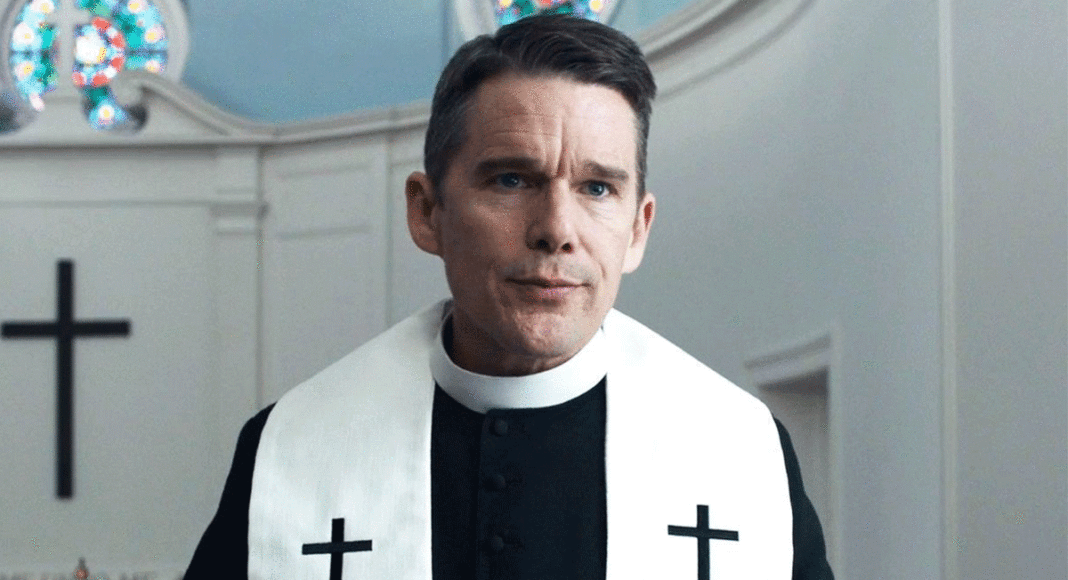In 1976, Paul Schrader wrote the incendiary script for Taxi Driver, about a troubled loner so disgruntled by the vice and corruption of modern life that he plots to stage a horrifying act of violence in protest. The state of the world has not improved much in the 42 years since then; we can now add the ongoing destruction of the planet to the list of humanity’s crimes—an issue Schrader now addresses through another troubled protagonist in his powerful new drama First Reformed.
Directing his own script, Schrader crafts a slow-building drama of despair, loss, and attempted redemption. At its center is a conflicted Protestant pastor whose tragic past and bleak present lead him to question his faith and his own purpose. Ethan Hawke plays the part with the desperate self-control of someone who knows he’s teetering on the edge of the abyss. All the elements are in place as Schrader’s dark gears of story and sensibility grind toward what seems to be their inevitable climax. It’s not until the last few frames that the movie goes a little off the rails.
The story revolves around a small First Reformed church in woodsy upstate New York, established in 1767. It’s now mostly a quaint, Dutch Colonial tourist attraction (once a stop on the Underground Railroad, shepherding runaway slaves to freedom), with a tiny congregation ministered to by its pastor, Rev. Toller (Hawke). The plumbing leaks and the organ doesn’t work; all the action (and the funding) is at the flashy, modern Abundant Life church down the road, the organization that now also operates First Reformed.
As plans are underway for the little church’s 250th anniversary, Rev. Toller starts writing a diary in longhand at night, fueled by bottle after bottle of hooch. This provides a voice-over narration to his daily activities, as well as a glimpse of his tragic past—losing his only son in Afghanistan, and the subsequent break-up of his marriage. Toller is having crisis of faith, feeling he’s a fraud in his profession. “If only I could pray,” he says.
Toller’s already shaky grasp on his duties is further challenged by Mary (Amanda Seyfried), a young parishioner whose eco-activist husband, Michael (Philip Ettinger) has just been released from jail. Mary is pregnant, but Michael doesn’t want to bring a child into a world with what he considers such a short expiration date. Michael pleads his case with a series of alarming statistics and videos, which only adds to Toller’s sense of despair.
The nature of their conversation shifts to the question, “Can God ever forgive us?” for destroying His creation. The jolly, convivial pastor from Abundant Life (Cedric Kyle)—Toller’s opposite in every way—tells him that God “wants our obedience. Maybe destroying the Earth is God’s plan.” The industrial tycoon whose corporation owns the churches turns out to be one of the most venal polluters.
Early on, Toller tells Michael “Courage is the answer to despair.” Toller is heading for some kind of breaking point, and Schrader keeps us on edge as to what form the pastor’s “courage” will take. And a sort of courageous act (although not the one we’re expecting) does conclude the movie. But while it works as metaphor, the practical logistics of these last few moments are so skewed, the movie loses focus when it most needs it.
Schrader’s filmmaking is moody and atmospheric—small figures under vast, mottled grey skies; the silent, empty rooms, devoid of furniture, in Toller’s house, outside the shadowy, candlelit room where he writes and drinks away his nights. Portentous musical chords signal every emotional shift, ever deeper and darker as we head toward the finale. The effect is so rich and haunting overall, you might be tempted to forgive the poorly realized ending.
FIRST REFORMED
**1/2 (out of four)
With Ethan Hawke, Amanda Seyfried, and Cedric Kyle. Written and directed by Paul Schrader. An A24 release. Rated R. 117 minutes.














Or, it’s just a boring film. ?
The book of Revelation predicts the calamities, (famine, war, etc.), that will occur before the return of Christ, and yes the world eventually will be destroyed (by God, not us, btw) by fire in judgement. Then, a new heaven and a new earth will be created.
I can understand why someone might feel despair, even a Christian, as the calamaties approach but the protagonist’s attempts to ” do something ” about this seem futile, even immature. Which might be the intention of the writer as I suspect much of the appeal of this movie might be the secret (and not so secret) delight some people feel at seeing Christian faith useless in the face of evil.
But one Christian’s crisis does not reflect the whole church. Christian faith is not useless in the face of evil. It is a shame the writer isn’t aware of this as it would have made for a far more creative story line.